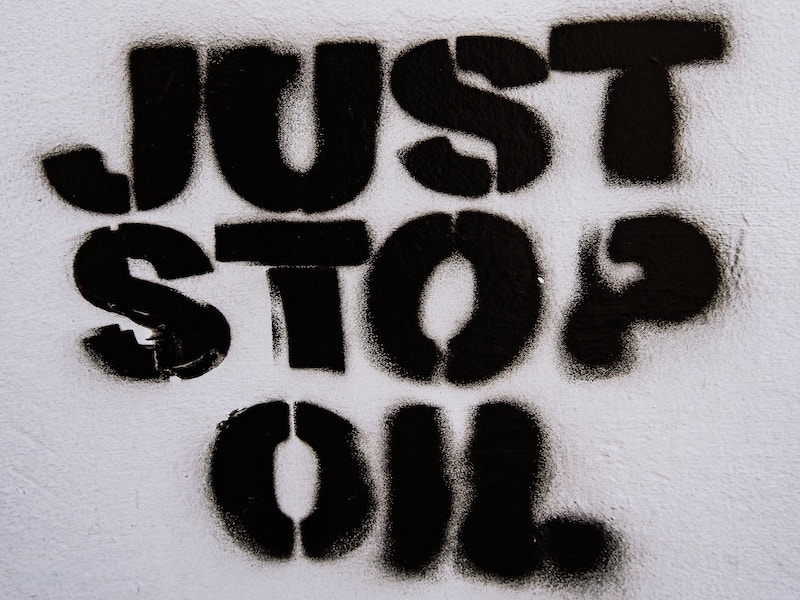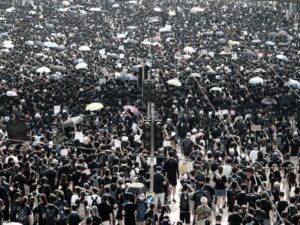Just Stop Oil are seen as extremists who threaten our way of life, rather than offering solutions created by that way of life
It’s become as predictable as strawberries and cream. Just Stop Oil’s distinctive sprinkling of orange was used to disrupt the Wimbledon Championships. The reaction from the crowd was just as predictable as a chorus of boos rang out. The same can be said for the media, who focused entirely on how much of a nuisance they are in spoiling people’s entertainment. What makes the reaction remarkable is that Just Stop Oil is attempting to raise awareness of the catastrophic disaster we’re hurtling towards, namely the climate crisis. They also have what seems to be a highly reasonable demand — for the UK government to stop financing new fossil fuel developments and begin an aggressive phase-out of oil in the UK economy. The apathy and downright anger shown towards them would be comical if it weren’t so tragic because the climate crisis is set to bring untold suffering in its wake for every living person. So why are they seen as a public menace who should be booed, rather than a group with the public interest at heart?
When you consider the nature of the climate crisis, the reaction to the group should come as no surprise. The climate crisis is a wicked problem for a reason. One of the main reasons why is that it doesn’t really feel like a problem, yet. Sure, it might be getting hotter, drier, wetter; sure massive numbers of animals and plants are going extinct; sure, the Amazon Rainforest is on the brink of collapse, but how does knowing any of that affect me right now? When I wake up in the morning, I unplug my fully charged smartphone from the electricity mains. When I open the fridge to make breakfast, it’s full of food. When I turn on the TV to watch the news, there’s no mention of a climate crisis. When there is coverage of global warming, it barely mentions just how catastrophic the situation is. When I turn on the shower, I’m soothed by hot water. When I step outside, everyone is going about their business as they always have.
The climate crisis is wildly different from the class struggle that defined the nineteenth and early twentieth centuries. Then, the working class were victims of a system that saw their labour turn into wealth that filtered into the hands of owners and managers. As a result, the middle and upper classes lived lives of privilege, while the working classes lived lives of poverty. Rather than an all-encompassing problem that isn’t perceivable, injustice was interwoven in people’s daily lives. Socialists were motivated to solve the injustice and offered an economic vision for what the solution looked like.
What only works to dismiss calls for radical action is the sustainability agenda. The Sustainable Development Goals, Corporate Social Responsibility and Environmental, Social and Corporate Governance present an illusion of change that leads the discerning public to believe that, sure, we have a problem, but nothing capitalism, this force of innovation, can’t solve. At face value, markets and governments appear to be creating tangible solutions to the ecological crisis. So groups like Just Stop Oil are perceived to be a bunch of radical extremists whose actions far exceed the problem being faced. It’s unclear why the problem would require systems change, leading to apathy towards radicalism.
The media’s reaction only works to reinforce the idea that radical environmentalists are a problem that threatens our way of life. During its international Rebellion in October 2019, for example, Extinction Rebellion (XR) was labelled a group of ‘ecomaniacs’. The column went as far as to encourage the use of water cannons against nonviolent protesters. During the Civil Rights Movement, peaceful protesters in Birmingham, Alabama, were attacked by dogs and blasted by fire hoses. Those images were shared around the world and caused moral outrage that worked to galvanise the Civil Rights Movement in America. In just the same way, the idea of using water cannons would work wonders in creating sympathy and galvanising the environmental movement, as the brutal reaction of the police would seem grossly disproportionate to the threat posed by peaceful protestors.
Here, again, is a crucial weakness of environmental activism. The actions of groups like Just Stop Oil and XR don’t garner wider public support because they’re seen as a menace to society, extremists who threaten our way of life rather than being viewed as a solution to a problem created by that way of life. Currently, actions taken by the police in arresting or breaking up protests are seen as wholly appropriate measures.
If you remove yourself from the fishbowl that is society, it would seem ludicrous that the ‘ecomaniacs’ are considered extremists. It sure feels extreme to continue on a path that is wreaking havoc on nature and could lead to collapse. Change the perspective, and groups like Just Stop Oil and XR are moderate, while those who continue to preach from the pulpit in support of economic growth — the growthmaniacs, if you will — are deeply irrational. Again though, from inside the fishbowl, this irrationality is entirely understandable because the catastrophic environmental impacts accompanying economic growth aren’t perceived in our daily lives.
People just aren’t engaged in solving problems if they don’t directly impact their lives right now. They certainly wouldn’t buy into the need for the government to implement radical policies or systems change. As the economist Milton Friedman put it in Capitalism and Freedom;
Only a crisis — actual or perceived — produces change. When that crisis occurs, the actions that are taken depend on the ideas lying around. That, I believe, is our basic function: to develop alternatives to existing policies, to keep them alive and available until the politically impossible becomes inevitable.
It’s only in moments of crisis that new ideas can flourish because it’s in those moments people realise how their lives are being directly impacted by the problem you’re trying to solve. For now, alternatives to existing policies are politically impossible to implement. Crucially, most people aren’t likely to support the environmental movement because it seeks radical change to the system that provides their prosperity. It’s only when a crisis hits, and it becomes apparent that the system threatens their prosperity, that more people will begin supporting calls for radical change. Until then, groups like Just Stop Oil will be considered a nuisance spoiling everyone else’s fun. Meanwhile, we’ll continue to sleepwalking towards the crisis they are desperately trying to avert.



